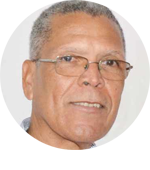
TOMORROW is Jounen Kwéyòl. Enjoy the celebration, but be careful. Because next day, there’s another celebration that some people are trying to slip down our throats. It has nothing to do with our heritage or our culture, as this time, they’re celebrating witches. And they’re using little children to work their magic.
Mind you, none of these musketeers actually believes in witchcraft, but they believe in profits, and they know that there’s millions to be made from selling the costumes and candy to unsuspecting innocent people like us. In the United States alone, retail sales of Halloween candy in 2015 were projected at US$2.6bn by the National Confectioners Association. Don’t get caught in this.
But we’ve strayed, as we’re supposed to be talking about being virtuous, or rather, being virtually virtuous. According to the Oxford on-line dictionary, “virtuous” means having or showing high moral standards, while the Free Dictionary defines “virtual” as existing in the mind, especially as a product of the imagination. So how do we manage to mix the two? We can, because we’re a creative people.
If we can stray a little more, very often as we have these discussions, the issue of whom we’re having them with and where we may be having them comes up. The English have “the man on the Clapham bus” to describe the average man, and someone writing to the newspapers here has used “the man on the mini-bus”. In the Caribbean, another has used “the man in the cane-field”, and that suggested that we consider “the man in the banana field”.
But we don’t “lime” in the banana field, and so, while the audience there was the right one, it wasn’t the right location. The next thought then was that of “the man under the coconut tree”, but, while according to the words of that song by the Hewanorra Voices many pleasant things have taken place there, for obvious reasons we don’t “lime” under the coconut tree – if you do, then one day a dry coconut will fall from it and hit you. So, we settled on “the man under the ‘ammun’ (almond) tree”. Fortunately, ‘ammun’ trees grow just about everywhere, so we’re not restricted to the one that you may be thinking of.
So, imagine that we’re a bunch of banana farmers having these discussions under an ‘ammun’ tree, anywhere in St. Lucia. In case some of us are feeling slightly let down by the company we find ourselves in, it might be helpful to point out that farmers have virtue too, and they possess some attributes that we might want to pay attention to.
For one thing, their minds are not cluttered by all the goings-on in America – they’re too tired after a day of honest hard work to pay any attention to that. They focus on the essentials: work hard, relax briefly, eat, sleep, and wake up early next day. Repeat.
For another, farmers, particularly banana farmers, only have one set of “good” clothes, and those are for Church. That’s because every other item of clothing has banana stains on it, and those stains are a farmer’s badges of honour. They work hard all week, and give thanks to the Creator at the end.
So that when storms like Matthew pass by, farmers recognize them as events over which they have no control, and while they might welcome any help that they can get in the aftermath, they know that ultimately, recovery depends on their own efforts. So, they shrug their shoulders, straighten their backs, and begin the process of replanting. They’re resilient. They also have little choice.
But maybe one of the most appealing aspects of farmers is that, no matter how hard they try to clean them, they’ve got dirt under their fingernails. Even after the most conscientious cleaning effort, you’ll find some dirt in the corner of the nail of at least one of those ten digits. That dirt is their connection to the earth, and to reality. Its hard to be pretentious when you have dirt under your fingernails, and so farmers focus on their reality: the phase of the moon, whether its going to rain or not, and what the task for the next day is. Our fishermen live a similar life.
It can be a hard and brutal life, but we built an entire nation on their backs, and they gave us our culture. First as slaves on the sugar plantations, then as workers on the banana plantations, and then as smallholders in their own right, our story is mostly their story. And then, just as we had begun to enjoy the fruits of their labours, we turned our backs on them, and on our culture too, and we decided to create our own reality. A virtual one.
It wasn’t so hard really, as we lived it every night on the television, and that soon became all day and all night. We became so immersed in that virtual world that we quickly lost sight of who we were, and where we had come from. For a while, the living was virtually, if not virtuously, good, and were it not for a few hardy souls at the Folk Research Centre, our heritage would long since have disappeared. But reality has a way of intruding, and we know now that we have been living virtually beyond our means, and borrowing to keep up the pretense. That’s not a virtuous way of life.
That detour was necessary partly to explain what had spurred the memory of that song, “The Coconut Tree”, and so spurred memory of the Hewanorra Voices, and of Ms. Joyce Auguste. A cultural icon, she helped to form the Hewanorra Voices in the 1970s and has recorded much of our creole music; she was also responsible for bringing the music of our culture to many of our schoolchildren. We’ve given her a medal and an award for her efforts, and in 2014 the Cultural Development Foundation recognized those efforts with a show honouring her, among others. Virtuous gestures, but should that be all?
Thinking of Hewanorra Voices led to memory of the Helenites, another group that recorded our folk music during the 1970s. And with that came the memory of Frank Norville, another of our cultural icons who first performed with the Helenites and then went on to establish his own track record. Sadly, Frank is no longer with us.
Frank passed away on April 08, 2015, and some six months later, as we celebrated JounenKwéyòl on October 25, 2015, our creative talents reached their zenith. Because on that date, we decided to honour one of our most prominent cultural icons with a Centre named in his honour, and so we created the Frank Norville Centre for the Creative Arts. Only thing is, you can’t find it anywhere – it’s a virtual centre, floating out there somewhere among the schools of the Gros-Islet district. Pure creative, disingenuous, genius.
One year later, and we’ve virtually forgotten you Frank. And we’ll quickly forget you too Joyce, just as we’ve long since forgotten Charles Cadet, who is also still with us.
Because, when it became convenient to honour Darren Sammy, we renamed the Beausejour Cricket Stadium in his honour. He may deserve the honour, but what does it say of us when we have no difficulty in honouring Darren with a physical structure, but Frank with a virtual one?
What does it say of us when we have no difficulty in erecting a $64m edifice as an indulgence to political posterity, yet we seek to create a virtual memory of one of our most treasured cultural icons. What does this say of us?
The efforts of the Cultural Development Foundation are to be applauded, and the work of the Folk Research Centre respected and supported, but surely, as a people, we can do a lot better than to create virtual storehouses for cherishing the memories of our greatest treasures.
That’s not being virtuous. Really.
Bon fèt!













